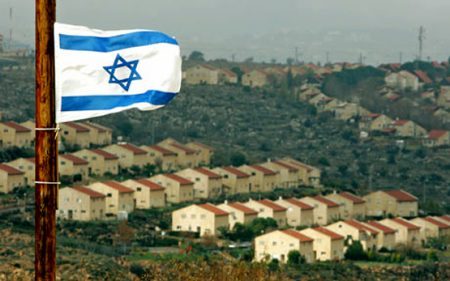Residents of the illegal settlement outpost of Amona, in the central occupied West Bank. voted on Sunday to approve a relocation plan put forward by the Israeli government, after weeks of discussions trying to assuage settler anger over the mandated evacuation of the outpost.
Israeli news outlet Haaretz reported that the settlers residing in Amona, in the Ramallah district — an outpost considered illegal by both the Israeli government and the international community — had decided to accept an evacuation plan which would see the majority of them relocated to a nearby hilltop by Dec. 25, following a ruling by the Israeli Supreme Court stating that the outpost was illegally built on privately owned Palestinian land.
“After 20 years of pioneering settlement, and against all odds, and after two years of struggle, we have decided to suspend our struggle, and take the government’s offer to build 52 houses and public buildings in new Amona,” Ynet quoted the Amona settlers as saying.
Ma’an News Agency further reports that, a week prior, several hundred ultra-religious right-wing Israelis set up camp in Amona, in anticipation of the outpost’s impending evacuation, raising tensions over a potentially violent confrontation between the settlers and Israeli forces.
Amona settlers had rejected previous plans which would have seen only half of them relocated nearby, whereas the current agreement will reportedly see almost all of them staying in the area.
However, Israeli rights group “Peace Now” has noted that the plan would have the settlers relocate to land privately owned by Palestinians, stating that “the Israeli government is replacing one land theft by another.”
Meanwhile, Amona Rabbi Yair Frank warned that, if the settlers deemed that the Israeli government was not fulfilling its part of the deal, “we will not hesitate to renew the fight,” Ynet reported, quoting the rabbi as saying that “we have no doubts that we’ll return to the whole mountain.”
In a cabinet meeting on Sunday, Israeli Prime Minister Benjamin Netanyahu reiterated the Israeli government’s “goodwill and love for settlement,” in finding a solution that would satisfy the Amona settlers.
“There has not been a government that showed more concern for settlement in the Land of Israel and no government will show more concern,” Netanyahu told the cabinet.
Haaretz reported that the Israeli government was set to approve a budget amounting to 130 million shekels ($33.5 million) for the relocation, which will include compensation, for the displaced settlers, and the establishment of a new settlement near the illegal outpost of Shvut Rachel.
Opposition lawmaker Tzipi Livni was quoted, by Haaretz, as lamenting that the agreement reached on Sunday was a sign that “the threat of violence works. What remains of Amona isn’t Zionism, settlement or any other value — just that the Israeli government caves to strongmen.”
Meanwhile, Ynet reported that the head of the Binyamin settlement regional council, Yossi Dagan, bemoaned the forced displacement of Amona, claiming that such procedures “would never have happened to the Bedouin in the Negev or any other population” — a statement which completely disregarded Israeli authorities’ policy of wide-scale demolition of Bedouin villages in the Negev and of Palestinian homes and buildings in Area C of the West Bank.
While the settler outposts constructed in Palestinian territory are considered illegal by the Israeli government, each of the some 196 government-approved Israeli settlements scattered across the West Bank are also built in direct violation of international law.
Members of the international community have rested the solution to the Israeli-Palestinian conflict on the discontinuation of illegal Israeli settlements and the establishment of a two-state solution. However, Israeli leaders have, instead, shifted farther to the right, as many Knesset members have called for an escalation of settlement building in the occupied West Bank, and some have advocated for its complete annexation.
A number of Palestinian activists have criticized the two-state solution as unsustainable and unlikely to bring durable peace, proposing instead a bi-national state with equal rights for Israelis and Palestinians.
(VIDEO) Growing Voices Among Palestinians Calling for a Single Democratic Secular State

